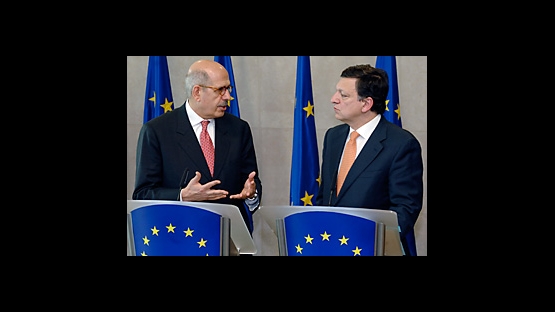The European Union (EU) has broken new ground in setting up a common legal framework for nuclear safety based on the IAEA′s main safety standards for nuclear installations and obligations under a key global Safety Convention.
"The EU is the first major regional body to adopt a binding legal framework on nuclear safety," said Mr. Philippe Jamet, IAEA Director of Nuclear Installation Safety. "The pioneering action is an important step that will help to strengthen cooperative safety efforts worldwide."
The Council of the European Union took the action in late June 2009, adopting a Directive on nuclear safety. The Directive provides binding legal force to the main international nuclear safety standards, namely the Fundamental Safety Principles established by the IAEA and the obligations resulting from the Convention on Nuclear Safety, including a regular peer review process. The Directive also reinforces the independence and resources of the national competent regulatory authorities.
Mr. José Manuel Barroso, President of the European Commission, expressed appreciation for the IAEA′s cooperative services, citing a meeting he had in May 2008 in Brussels with IAEA Director General Mohamed ElBaradei. He said they had the chance to discuss the importance of developing a common European framework on nuclear safety. "By providing binding legal force to the main international nuclear safety standards, in particular those established by the IAEA, the EU could become a real model for the rest of the world in the context of renewed interest in nuclear energy," he said.
The IAEA Fundamental Safety Principles are jointly sponsored with nine partner organizations. They provide the grounds for establishing requirements and measures for the protection of people and the environment against radiation risks, and for the safety of facilities and activities that give rise to radiation risks. These include, in particular, nuclear installations and uses of radiation and radioactive sources for peaceful purposes, the associated transport of radioactive material and the management of radioactive waste.
The Directive of the EU - which has the largest number of nuclear power plants in the world - applies to IAEA safety standards for nuclear installations. A number of EU countries are looking to start or extend their use of nuclear power to meet electricity demand, improve security of supply and tackle climate change. Twenty-seven countries form the EU: Austria, Belgium, Bulgaria, Cyprus, Czech Republic, Denmark, Estonia, Finland,France, Germany,Greece, Hungary, Ireland, Italy, Latvia, Lithuania, Luxembourg, Malta, Netherlands, Poland, Portugal, Romania, Slovakia, Slovenia, Spain, Sweden and United Kingdom.


